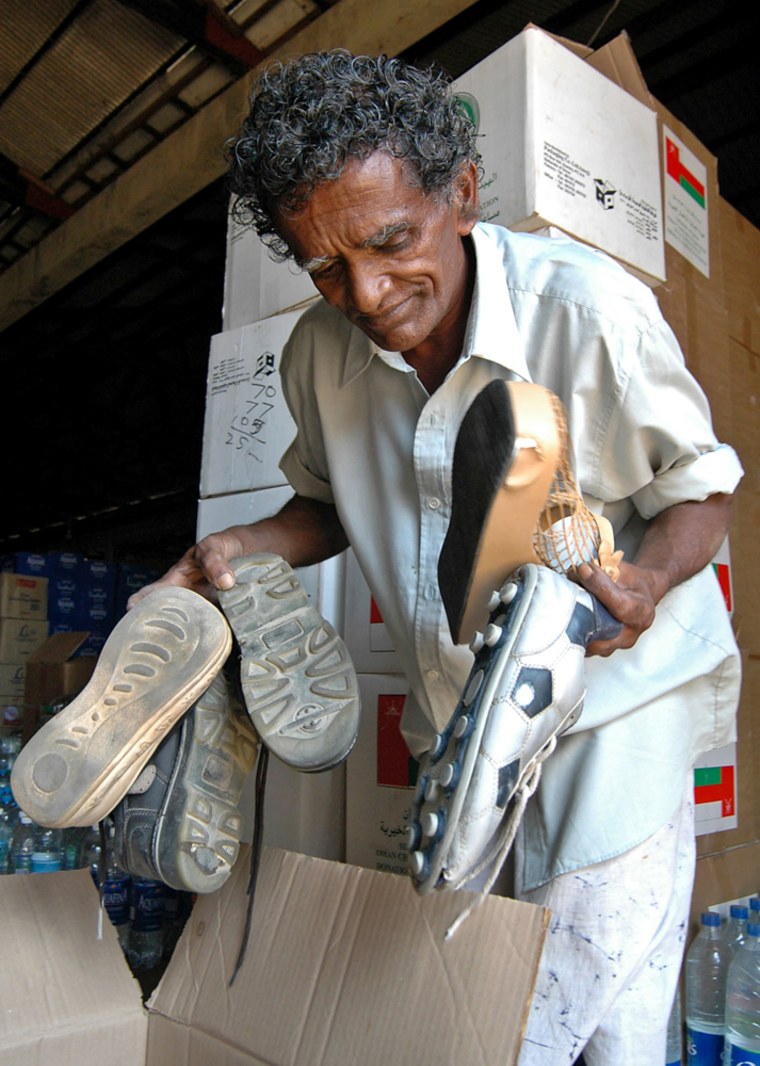At the main warehouse in Galle, mountains of cardboard boxes and suitcases ready to burst take up a quarter of the cavernous building.
Some are labeled “Aid for Tsunami Victims,” but their contents — winter jackets, expired cans of salmon, stiletto shoes, winter tents, thong panties and even Viagra — have left Sri Lankans scratching their heads.
Unprecedented aid poured in after the Dec. 26 tsunami, but some of those wanting to help were perhaps too eager, shipping items of no use in tropical Sri Lanka. And seven weeks after the disaster, no one knows what to do with some supplies piled up at government buildings, aid agencies and refugee camps.
“These items just cannot be used here,” said storekeeper H. Wickremabandara, noting the average temperature is 82 degrees. “There are all these old clothes and no one wants them.”
No more bottled water, please
Banners along the devastated coast read “Help the displaced” and “We need your help,” with an arrow pointing to a nearby refugee camp. But authorities, aid workers and the displaced have a common plea — no more clothes and bottled water, please.
In the warehouse in Galle, a hard-hit district where aid is being distributed to 120,000 people, cardboard boxes are stacked to the ceiling.
Battered suitcases tied with rope or tape contain blankets, winter coats and woolen Mickey Mouse pajamas. One suitcase held only heavily embroidered curtains — complete with steel hooks.
Boxes were torn apart by the weight of bottled water, some collecting dust as more unwanted stocks arrived.
Surprise boxes
Although bottled water was initially needed urgently, most water sources have been restored and purification systems have been set up by aid agencies.
Officials also complain that labels don’t always tell the full story, meaning every box must be inspected. Three boxes labeled sheets actually contained wool blankets. Expired cans of salmon were found among clothes.
In a country where most people wear flip-flops or sandals, some boxes held only used shoes, including soccer cleats, boots and silver evening shoes with 4-inch heels.
Most of these unusable supplies are from individual donors, small overseas charities or private companies. Others were from Sri Lankans who seemed to have cleared out their closets.
The larger aid agencies conduct surveys before sending aid, or link up with local non-governmental groups to assess needs.
“We don’t have such problems as we don’t accept any stuff that the people don’t need,” said Charles Blake of the International Committee of the Red Cross, pointing to much-needed hygiene kits and sleeping mats.
Real problem: clothes
Though Sri Lankans laud donors for their good intentions, it appeared some suppliers didn’t think before sending a shipment.
R. Buddadasa, a state official handling relief in Galle, said milk from the Middle East and Austria was held back because of worries it would spoil. Eighteen boxes, each containing 100 baby bottles, also were not sent to refugees due to the lack of sterilization facilities in the camps.
But clothes are the real problem. Keerthi de Soysa held her head as a truck unloaded seven cardboard boxes full of clothing at a makeshift camp in Balapitiya.
“Oh no! More clothes,” she said. “We’re not beggars. We don’t need these hand-me-downs.”
The new arrivals will likely end up on a heap in the compound where refugees cook over open fires and use garments as pot holders.
“It’s clear that some people have sent clothes that are actually meant to be used as dusters,” said Himali Fernando, another aid official. “We don’t mean to be ungrateful, but it would be appreciated if people take a little more care before just unloading their basements and garages.”
An embarrassed Fernando said the black-and-pink thong underwear will not be offered to refugees. Nor would a spaghetti-strap, sequin-studded black evening dress. Still, she said, nothing will be thrown away. Warm clothing may be sent to shelters or to tea plantation workers in the hills, where the climate is cooler.
Among the most unlikely supplies sent in were six packs of Viagra from Australia, said Gandhi Saundararajan of the Tamil Rehabilitation Organization.
